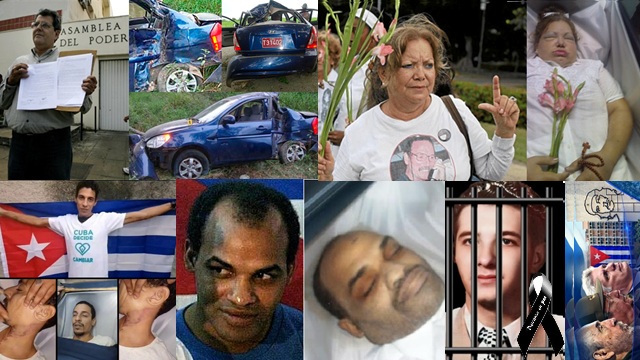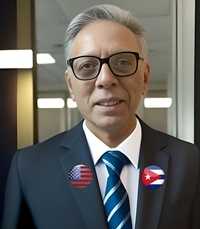 Is Armed Conflict the Only Alternative for Cuba’s Freedom?
Is Armed Conflict the Only Alternative for Cuba’s Freedom?
Unfortunately, all peaceful means have failed, and the Castro-communist dictatorship has left no other option. Cuba's freedom can come at a high cost in human lives.
The Exhaustion of Peaceful Ways in Cuba: A Critical Analysis
Cuba's history under the Castro regime has consistently demonstrated the failure of peaceful ways to bring about democratic change. For more than six decades, every attempt at nonviolent opposition has been met with brutal repression, selective assassinations, and mass incarceration, evidencing the regime's intransigence in the face of any form of request for democratic opening and even the slightest claim for a human right has been brutally repressed with imprisonment and exceedingly in fabricated cases against peaceful opponents.
Systematic Repression of Peaceful Dissent
The pattern of dictatorial violence against advocates of peaceful change is manifested in emblematic cases such as that of Pedro Luis Boitel, who died in 1972 during a hunger strike after being denied water on direct orders from Fidel Castro. This pattern continues to this day, as evidenced by the death of Orlando Zapata Tamayo in 2010 after 86 days of hunger strike initiated after being brutally beaten in prison and denied water for 18 days in Kilo 8 prison, and the suspicious death due to lack of medical attention and induced death of Laura Pollán, leader of the Ladies in White, in 2011.
The assassination of Oswaldo Payá in 2012 represents perhaps the clearest example of the regime's hostility to peaceful democratic initiatives. Payá, who had collected more than 11,000 signatures for the Varela Project seeking a democratic referendum, was eliminated in a vehicle accident orchestrated by the Ministry of the Interior, demonstrating that the regime will not tolerate even the most moderate reform proposals.
The Cuban Observatory of Human Rights holds the Castro regime responsible for the death of 4 political prisoners who were peaceful demonstrators on July 11, 2021.
Manuel de Jesús Guillén Esplugas, a peaceful protester July 11, 2021, who was being held in the Combinado del Este, a Havana prison died on November 30, 2024, Jesús Guillén Esplugas died from a beating he was given in prison, according to Justicia 11J and Cuba Decide, of which he was a promoter, becoming the third prisoner killed related to those historic protests against the dictatorial regime of Cuba.
The OCDH also recalled the death of Luis Barrios Díaz, 37, who died on November 19, 2023, due to respiratory complications due to medical negligence by prison authorities at La Covadonga Hospital in Havana.
Failure of Diplomatic Initiatives
International diplomatic efforts have been equally unsuccessful. The historic opening of the Obama administration, far from encouraging reforms, resulted in an intensification of repression. The Vatican's efforts for a democratic opening were similarly ignored. The regime's violent response to the peaceful protests of July 11, 2021, which resulted in thousands of arrests and long prison sentences, confirms its absolute rejection of any form of dialogue or democratic concession.
The Inevitability of Armed Resistance
Historical evidence demonstrates that the Cuban regime has systematically closed all peaceful avenues for democratic change. The deaths of 14 political prisoners on hunger strikes between 1966 and 2020, documented by the International Commission for Justice Cuba, underscores the human cost of nonviolent resistance. The regime has shown that it will respond with lethal violence to any challenge to its power, regardless of how peaceful.
This reality raises an inevitable conclusion: after 66 years of totalitarian dictatorship, the armed path emerges as the only remaining option to achieve the liberation of the Cuban people. This conclusion is not reached by ideological preference but by the systematic elimination of all peaceful alternatives by the regime itself.
The failure of every peaceful initiative, every attempt at dialogue, every nonviolent protest, and every diplomatic effort has not been accidental, but the result of a deliberate policy of the regime to maintain its power at any cost. History shows that the Castro regime will never voluntarily relinquish power, regardless of the peaceful pressure applied to it.
This reality presents the international community and the Cuban people with a difficult but clear choice: accept the indefinite perpetuation of a totalitarian dictatorship or recognize that the liberation of Cuba will inevitably require the use of military force to dismantle a regime that has proven impervious to any other form of change.
The Last Peaceful Chance for a Transition
The policies of the new Trump administration with new leaders in its cabinet such as Marco Rubio and Ted Cruz may also increase the pressure with more drastic sanctions against Castroism and the countries that negotiate with the dictatorship as the last attempt to force it to make a peaceful transition. Although all the cards are supposed to be in play and some kind of armed intervention is also on the table.
The Million-Dollar Question: Can Cuba Free Itself From Castroism Through Peaceful Civic Struggle?
Many of the Cuban and exile dissident organizations are committed to peaceful civic struggle, including many that in the past bet on military confrontation with the dictatorship, but they should be thinking of a plan B and C that does not rule out armed confrontation with or without the intervention of the United States.
The Harsh Conclusion
Unfortunately, the Castro-communist dictatorship has left no choice, and Cuba's freedom could come at a high cost in human lives if the United States does not intervene to surgically execute the murderous Castro-communist leaders who oppose peaceful change. The United States has the duty and the right to participate in an armed confrontation against the Castro dictatorship since it historically represents one of the enemies that has caused the most damage to its national security and the lack of political will has allowed Castro-communism to continue promoting not only hatred of the United States from the backyard and even participating in the espionage and support of the powers communists and Islamic terrorists.
José Tarano is a technical producer, graphic designer, collaborator, and researcher at Patria de Martí ► and The CubanAmerican Voice ►. He holds a bachelor’s degree in Electrical Engineering in Telecommunications from José Antonio Echeverria Superior Polytechnic Institute (ISPJAE). In addition, he is the founder and director of Electronics JR Computer Design and Service ►, a computer and information technology services company. Originally from Santiago de las Vegas, Havana, Cuba, he currently resides in the United States.


 🖋️Author Jose Tarano
🖋️Author Jose Tarano